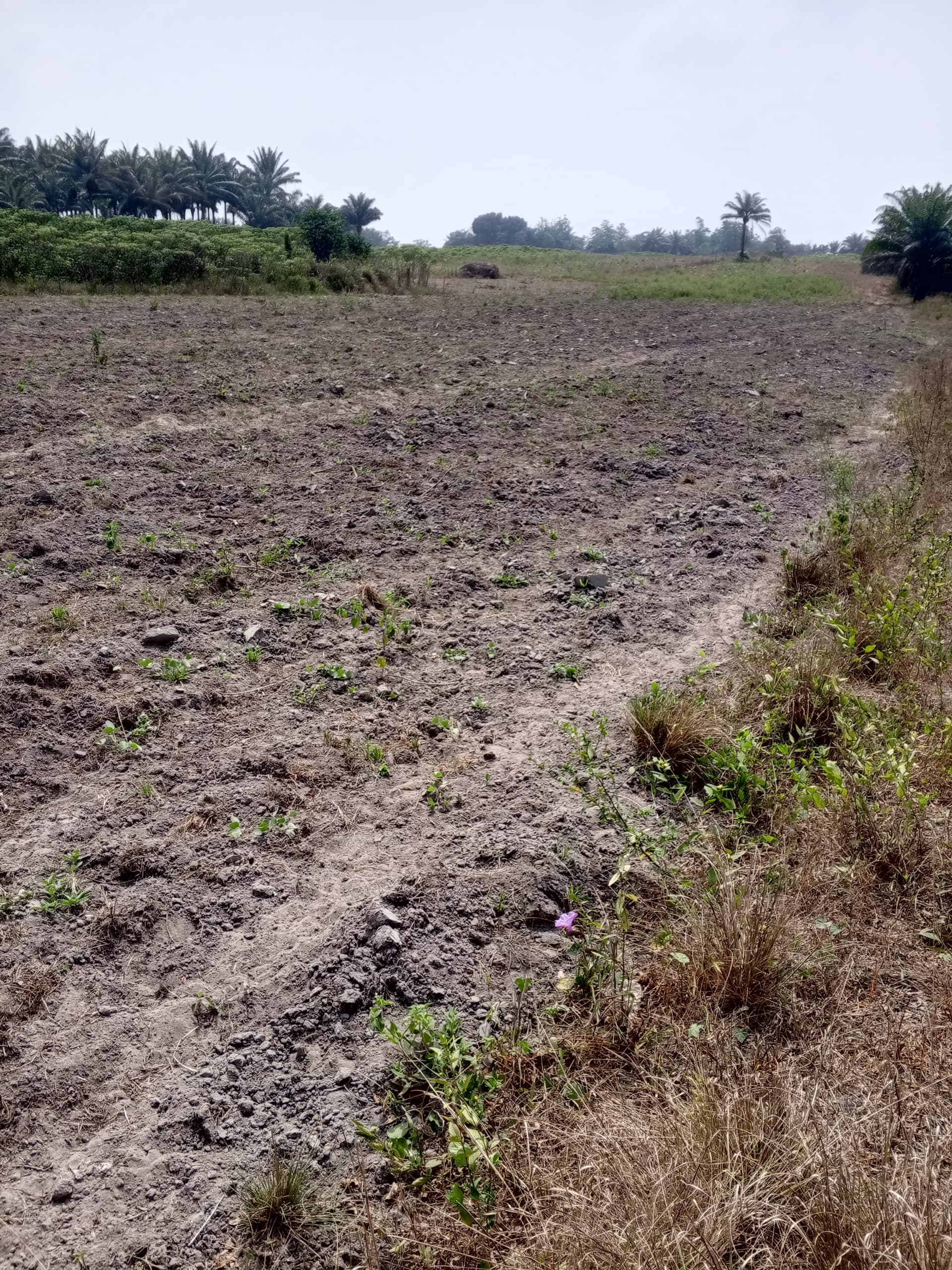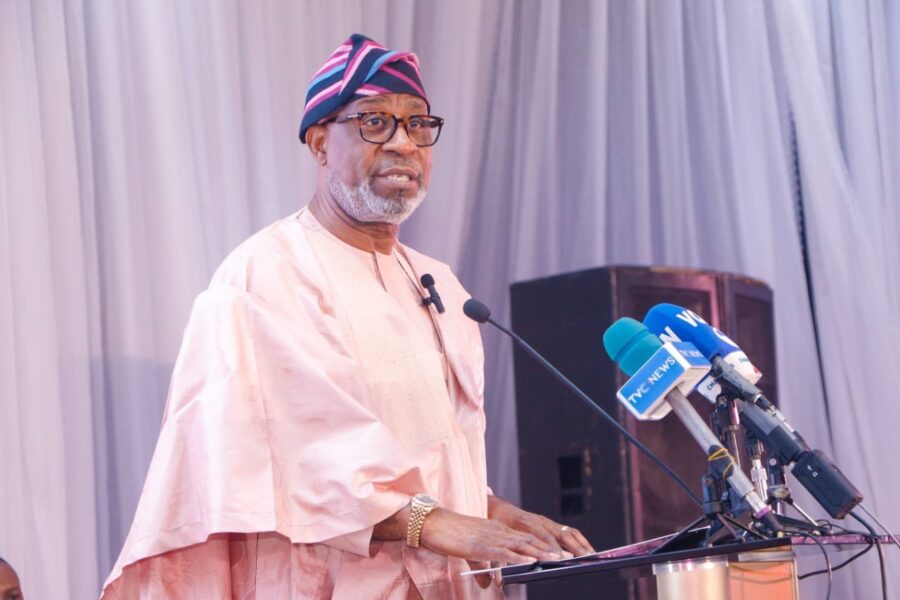The sleepy town of Ado Odo, in the Ado Odo Ota local government area of Ogun State has an attraction to those who have an eye for wealth. The town is blessed with black clay, the raw material used to produce tiles. A fresh layer of this black clay has been discovered at the Iloro and Ibiri communities in the town, and a company, SAF Investment Limited, was granted an official permission to mine the mineral. In fact, following the approval granted in December last year, the company had started moving equipment to the site before the middle of January this year.
On the surface, such a move should be a reason for jubilation, after all the prayer is for Nigeria to be able to produce what it consumes instead of importing foreign goods for local use. And since there are companies producing tiles in Nigeria, it should be a thing of joy that such companies source raw materials locally. That, ordinarily, would be in line with the promotion of the spirit of local content in the production sector, and a boost to the economy. Was that the thinking of officials of the Ogun State government who facilitated the approval for the company to excavate the black clay deposit in Iloro and Ibiri? If that is the motivation, it is difficult to decipher, particularly because some of the officials got somewhat desperate that the excavation was to have been done without consideration for the wellbeing of the locals nor were they bothered about the disruption of the agricultural plans that birthed the over 60-year-old farm settlement within which the land bearing the clay deposit is located.
The site is believed to measure over 20 hectares of land, within the over 3,000 hectares of the Ado-Odo Farm Settlement. And it is not buried in a remote area. That simply means that transporting it to the factories in need of raw material would be less stressful.
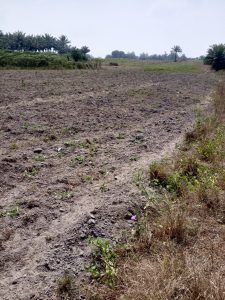 Part of the land targeted for excavation at IloroT
Part of the land targeted for excavation at IloroT
Farmers at the Farm Settlement started having a hunch when about two years ago some officials of the government came with people, they suspect were miners who were there to inspect the clay deposit sites. Though there was no discussion with the farmers or communities over the intended mining activities, the Ado-Odo Farm Settlers Council, in a letter dated September 5, 2023, decided to raise an alarm, asking the state government to help stop any attempt to cede the place to miners. In the letter, addressed to the Permanent Secretary in the Ministry of Agriculture, they sought to alert him of the inspection visits, adding that that was how it started in 2019 before an earlier approval for mining on the farm was stopped by former Governor Ibikunle Amosun.
If that letter got to the table of the permanent secretary, it did not seem to have any effect. The more the farmers tried to find out if there was a response for them from that office, the more they got inundated with reports that, on the contrary, efforts were in top gear to give approval to a mining company for excavation of the black clay at the Farm Settlement. So, in a petition to the office of the Commissioner for Agriculture, the Farm Settlers Council pleaded with the government to “stop this move so as to guide against any environmental degradation, damage to the farmland and serious danger to the community.” The letter of appeal, signed by Mr. Titus Akanji Lasilo and Mr. Dare Onifade, chairman and secretary respectively, was dated December 3, 2024. While they waited for a reaction to the appeal, SAF Investment & Property Limited got a letter of approval “to proceed with your mining operation at the three (3) locations within Ado-Odo Farm Settlement.” The three locations are Iloro 1 & 2 and Ibiri. That letter and another, addressed to the Director of the Department of Agricultural Services in the Ministry of Agriculture, were dated December 5, 2024, two days after the Farm settlers wrote their letter of appeal. The two letters, one to SAF Investment and the other to the director in the ministry, bore a name that is familiar to the farmers. They were signed by Mr. Fashola O. S, Director of Planning, Research & Studies in the ministry. Fashola, according to the farm settlers, was the same official who gave authorisation to a company that would have started that excavation back in 2019. Fashola’s letter of December 5, 2024 had conveyed to the company the approval titled
RE: EXPRESSION OF INTEREST IN THE EXCAVATION OF THE TOP SOIL OF PARCEL OF LAND DISCOVERED TO BE BLACK CLAY FOR THE PURPOSE OF COMMERCIAL/INDUSTRIAL USE.
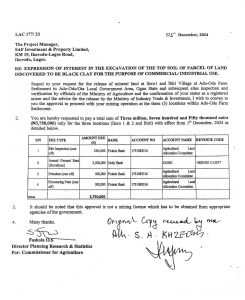
From the day the settlers got that information, panic walked on all fours in the farm and the community as a whole. There was a sense of foreboding that if Fashola, who had been stopped by the instruction of a former governor, could return to the relevant department in the ministry to carry out the same task, then there was more to his action than meets the eye. Was he acting under a more superior order? Has the state executive decided to yield the farmland to miners? Is the state executive aware of the step being taken by the affected officials? Why were the letters of appeal not responded to by the authorities? A lot of questions started raging in their minds. There was confusion and fear.
Before they could come out of that shock, the company had started to mobilse to site. In fact, the youth in the Iloro community had to confront staff of the company when they brought some of their equipment to site.
Farm Settlers claim that the ministry of agriculture, under which they got allocated portions of farmland, did not engage with them to know what impact the mining activities would have on them and their work nor did they relate with the people of Iloro community. Meanwhile, no fewer than seven of the settlers will be impacted by the mining activities, if allowed to take off. The Iloro community, in particular, will definitely be at the receiving end of any degradation done to the land even as the only school in the community, Baptist Day Primary School, is just within reach of the site and certain to be impacted. It looked like the approval for the mining activity was a recipe for disaster in a town that has started getting used to a breath of fresh air, coming after years of upheaval.
Just then, Engineer Noimot Salako-Oyedele, the state deputy governor, moved in to halt the process. That was the feelers that Bushlink got from Abeokuta during its investigation. Thus, the apprehension in the air was doused and the fear entertained by the locals eased. That step by the deputy governor was a testament to the fact that the approval for mining of the black clay at Iloro and Ibiri did not have the imprimatur of the executive arm of the government. Unknown to the affected farmers and the communities, while it appeared that the government was impervious to their feelings, the issue of how to curb indiscriminate mining activities in the state was on the front burner. That informed the signing, last year, of an executive order by Governor Dapo Abiodun aimed at checking the activities of some traditional rulers and community leaders from releasing land for mining without recourse to the state government or consideration for the host communities. Ado-Odo is one of the areas protected by that executive order. The governor also created the Ogun State Mineral Resources Development Agency, which is empowered to relate with ‘host communities and local governments for the conduct of geotechnical and geological survey of solid mineral deposits in the state’.
Unfortunately, the government did not expect that officials who should enforce that law would end up encouraging its breach. The saving grace is that the government listens to traditional title holders who stand with the law and the people. Otherwise, there would have been chaos in some parts of the state, as a result of indiscriminate approval for mining operations, without due consultations with the host communities.
Oba Olusola Lamidi, the Olofin of Ado Odo, according to a palace source, is one of those traditional rulers who get the ears of the government in his efforts to ensure that the law is followed to the letter. He was said to have been working behind the scenes on the Iloro and Ibiri matter to prevent a repeat of the experience of other communities in his kingdom following similar excavations in their domains. Olofin was not just prompted by the purported approval of last December. As soon as he got on the throne, he had noticed the damages caused by the indiscriminate mining activities in villages under Ado Odo, and the monarch took steps to address the issue. Though Bushlink made efforts to speak with Olofin on the issue, he could not grant us an audience. However, Prince Tajudeen Lamidi told us the efforts made by the palace to ensure that proper coordination was given to activities of miners in the area. He said Olofin had last year called a meeting of stakeholders and initially got matters straightened out. Mining activities stopped for a while. Shortly after, the miners returned to site, apparently emboldened by some unscrupulous government officials who misinterpreted the executive order signed by Governor Abiodun. Again, the Olofin, according to Prince Lamidi, approached the authorities to seek clarification on the executive order, informing them that it was being misinterpreted to get miners back on the sites where they had been made to stop work. After his meetings with “the commissioners of Agriculture and Land”, among others, it was confirmed that the returning miners and those who encouraged them stood the law on its head. The ugly situation was arrested.
But the miners and their collaborators within the government were not done yet. No sooner than that was done than some ministry officials and miners resumed the inspection of sites at Iloro and Ibiri. As is the practice of these officials, they made no consultations with the community and, in this case, the farm settlers, whose farming activities will be directly affected by the miners’ jobs. Conscious of the happenings in other communities like Idobarun Oko, the farmers raced to Abeokuta to protest the development. The monarch was equally undaunted. He resumed consultations to ensure peace in his domain.
Prince Lamidi was concerned that those behind the attempt to bring back the miners into the communities by crook did not even care about the livelihood of the people in the communities. He wondered whether attempts were made to conduct environmental impact assessment in the area or discuss with the people who will be impacted by the activities of miners.
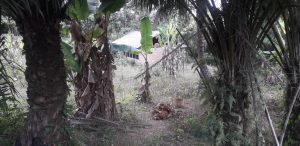
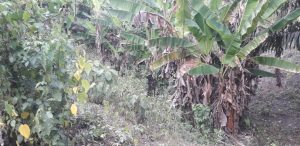 Photos showing the gauges now overgrown at Idobarun.
Photos showing the gauges now overgrown at Idobarun.
The prince raised some valid points there, for failure to do those things will be a violation of the Minerals and Mining Act of 2007, which is the primary law guiding mining or solid mineral exploitation in the country.
The Act in section 119 states that : “Every holder of an Exploration Licence, Small-scale Mining Lease, Mining Lease, Quarry Lease and Water Use Permit shall- (a) prior to the commencement of mining operations; or (b) upon application for an extension of the term; or (c) upon an application for the conversion of a mineral title, submit to the Mines Environmental Compliance Department- (i) an environmental impact assessment statement approved by the Federal Ministry of the Environment in respect of the exploration or mining operations to be conducted within the Mineral Title Area; and (ii) an Environmental Protection and Rehabilitation Program containing such details as may be provided for in the environmental regulations issued pursuant to this Act.” Bushlink could not immediately confirm if the company had complied with that regulation.
However, people in the affected communities doubt that the company followed the law. They expect that had a proper environmental impact assessment been done, the miners should have known that doing excavation in less than 250 metres to a school compound is ill-advised. Besides, the two Iloro 1 & 2 sites are in the heart of the Ado Odo Farm Settlement, set up by the defunct Western Region, under the leadership of late Chief Obafemi Awolowo. What that means is that farms will be affected, as well as farmhouses used by farmers and farm hands. Yet, the company did not deem it fit to enter into any dialogue with the farmers, who also pay ground rents to the state government, being legal occupants of the facility. Not only that, by law, SAF Investment Limited is also expected to have held meetings with the locals, before setting out to do any form of excavation right under their noses. Prince Lamidi said there was no discussion with any Bona Fide representative of the communities by SAF Investment Limited before they started moving equipment to site. Mr. Tajudeen Adeyemi, community leader at Iloro, corroborated Prince Lamidi, when he said that the company had not engaged anyone within the locality on the planned mining. If that is true, then it is a clear breach of section 116 of the Act, which states that: “Subject to the provisions of this section, the holder of a Mining Lease, Small Scale Mining Lease or Quarry Lease shall prior to the commencement of any development activity within the lease area, conclude with the host community where the operations are to be conducted an agreement referred to as a Community Development Agreement or other such agreement that will ensure the transfer of social and economic benefits to the community.” Perhaps the company suspected that the locals would be circumspect in entering into any agreement with them for a release of their land for mining. This is not unconnected with the reputation of some of the companies operating in communities around Ado-Odo.
For instance, about two weeks ago residents of Aromokala and Elemogi communities besieged the palace of Olofin to hint him of a planned protest against the miners in their locality. According to Prince Lamidi, “Aromokala and Elemogi communities came to the palace to report on the mining activities going on there. They said in 2019 they (the miners) promised they were going to give them solar light, they promised they were going to give them a block of classrooms, but (the communities are yet to get anything from the miners though they have been operating since that time).” The palace advised them to inform the police of the planned protest. The prince also told the story of a tragedy at one of the mining sites. While complaining that the miners’ operation was below the standard set by law, as they hardly comply with the regulations including the erection of barricades around the mining sites, the prince said, “About three or four months ago we learnt that two people sank into the waters in their mining site.”
Stories like these assail Iloro community leaders when the issue of the excavation in their area comes up for mention. The contemptuous manner of the company and the holier than thou attitude of officials equally riled the locals, which informs the confrontation that representatives of SAF Investment & Property Limited met when they ferried some of their equipment to the site, an indication that the host community would be decidedly hostile.
That was what the monarch had tried frantically to prevent. Relief came when the deputy governor stepped in to douse the fire that would have been ignited in Ado Odo. For this reason, Prince Lamidi was full of praise for her. He said, “We give thanks to the deputy governor, she did very well. She is a mother. She said, ‘If you want to do anything, you ought to be in touch with the community.’” Obviously elated that crisis had been averted once again, the prince declared, “It (the approval) has been revoked. With the little knowledge I have, though I have not seen the official document, it has been revoked. That is why they are unable to work.” That swung the case in favour of the communities and the Farm Settlers Council. Though we could not get hold of a document spelling out the revocation order, a source in the ministry of Agriculture, who would rather not be quoted, told Bushlink, “The letter (of approval) has been withdrawn. They don’t have a right to do any excavation there… There was a mistake initially and the letter has been withdrawn. So, the letter is (no longer) valid. They are not supposed to excavate anything there.”
Will this be the last? That is the question on the lips of the locals. They recall encounters since 2019, and the surprise rebound of attempts to impose the miners on the people of the area, despite the sad stories of communities like Idobarun, Aromokala and Elemogi. For instance, at Idobarun where excavation activities had stopped some years back, people in the community still have to contend with the land degradation caused by the miners. The gauges created have become bushy, and not just dangerous for people to navigate but in some cases the gauges harbour dangerous animals. The people of Ado-Odo are, therefore, as grateful to the state government as they are thankful to their traditional ruler. Prince Lamidi who said, “Kabiyesi has invested more energy to contain the activities of the miners”, however, expressed concern that the miners hardly give up their pursuit of a land to excavate. Hear him: “They are stubborn; the miners are very stubborn. Once they see any prospect somewhere they want to start mining at all costs.” He also fingers civil servants as collaborators in the desperate pursuit of land to mine with little or no respect for the law and the feelings of the host communities. He said, “The problem we are having in the communities is the ministry. When they (the miners) go there, they (civil servants) give them a license to go and operate.” That stands to reason, for what could have motivated the revisit of an issue that had been stopped by a former governor, which is also an obvious violation of an executive order signed by the incumbent governor vis-a-vis the provisions of the Mining Act?
So, while they are happy about what they believe to be a reprieve, the locals are not celebrating yet. This is because they are worried that the desperate search for mining sites has become a vicious cycle, the end of which can hardly be predicted. Surely, the government would need to continue to keep an eye on the desperate miners, the pliable civil servants and some greedy community leaders who place their interests above the wellbeing of the community and the policy of the government.








